Republic: The Revolution
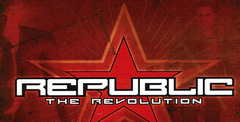
| a game by | Elixir Studios |
| Platform: | PC (2003) |
| User Rating: | 8.5/10 - 4 votes |
| Rate this game: | |
| See also: | Strategy Games |
The one thing that’s always been clear about Republic: The Revolution is that it was never going to be your average game. From the off, start-up developer Elixir made it clear it was doing something remarkable, tossing out facts and figures that were so far beyond our expectations of what was feasible with current technology that all we could do was nod our heads gravely and pretend not to be surprised.
Since then any scepticism on our part has been put to rest, as we’ve not only seen this extraordinary real-time strategy game in motion but coerced Elixir boss and Republic mastermind Demis Hassabis to explain the technology to us in terms even we technical lackbrains could grasp. So yes, there will be close to a million individual citizens populating the Fictional Soviet republic of Novistrana. They will all look noticeably different, and each will possess their own daily routine, beliefs and loyalties. And, indeed, there will be a hugely flexible Al that allows these citizens to react to your political machinations in a totally natural-seeming way.
And tliis is what the game is all about: using any means necessary (political, criminal, military, religious or business) to gain enough support amongst Novistrana’s citizenship to become the new President. Sounds easy enough, except that you’ll be competing with up to 15 other endlessly cunning and resourceful faction leaders with exactly the same thing in mind.
Between Freedom And Fear
One reservation that remained even after we’d come to terms with the technology powering the game was the dauntingly large-scale and freeform nature of the gameplay. Luckily, Demis was on hand to reassure us: "That’s something we’re carefully monitoring. Freedom to choose your own path to victory and non-linear gameplay is something 1 strongly believe ±e majority of gamers enjoy, but of course we cannot allow the player to feel lost. There will always be help at hand in the form of a right-hand man giving useful advice when the player gets stuck. And there are clear structured things that have to be achieved on the way to becoming President."
Demis also assured us that Republic can be played at almost any level of involvement, making the game only as hardcore as you want it to be. So, for example, you could take a very hands-on approach, overseeing every action and decision right down to selecting which commodities the shops in your town will sell. Or, you can simply sit back and watch events unfold, tinkering with things when you feel the urge but essentially treating the game as a simulator.
We were also a little worried that despite the obvious power of the graphics engine, some of the screenshots seen thus far were a little underwhelming, drab even. We asked Demis just how indicative they were of the final look of the game: "Not very -they really just served to show what sort of look and feel we were aiming to create, without core things integrated such as lighting, shadowing, occlusion, detailed textures, etc."
Phew. Everyone breathe a sigh of relief, confident in the knowledge that the game will be a major revolution for strategy gaming after all.
The only remaining issue is the multiplayer game, which may or may not be included on the initial release. "We have many cool ideas for multiplayer possibilities in the future," consoles Demis, "including cooperation and even some pretty far-out massively multiplayer ideas, but it’s a bit early to be talking about them. We’ll see how Republic does and then decide where to take things from there."
Download Republic: The Revolution

System requirements:
- PC compatible
- Operating systems: Windows 10/Windows 8/Windows 7/2000/Vista/WinXP
Game Reviews
Now pay attention class, we're having a little test (sit down at the back, no one leaves till the bell rings). Do the following names and phrases mean anything to you? Hagbard Celine Immanentizing the Eschaton. Igor Komarov and Jason Monk. The Illuminati. INWO. Mr Phelps and the IMF. Floor 13. Niccolo Machiavelli. Fnord.
If you recognised at least half of those then chances are you'll have had the kind of grounding that has set you up perfectly for Republic: The Revolution. If you thought I was merely throwing random words at your face, then I'm sure there are some pages with Lara Croft's new buttocks around here somewhere to keep you entertained.
You see there hasn't been a game that has so divided the opinions of players since Black & White, appropriate enough since Republic has been masterminded by one of B&W creator Peter Molyneux's own proteges, Demis Hassabis, along with his team at Elixir Studios.
In fact, they've been masterminding it for so damn long now that the real world has seen more unprecedented political upheavals than this virtual simulation can ever hope to mirror. All the in-game actions that you can carry out in your quest for power pale in comparison to the kinds of machinations that saw Robert Mugabe outlaw democracy in the 'republic' of Zimbabwe; a talking monkey in a suit take hold of the US presidency thanks to some friends of his dad; and the Goodge Street Adult Import Emporium be supplanted by the 78th branch of Starbucks to take root within a one mile radius of Tottenham Court Road tube station.
Evil Genius
People will either love Republic or hate Republic and never the twain will meet. It's a game you will either 'get' or you won't, those that do marvelling in the exploration of subversive power, those that don't oandying phrases such as "boring" and "Emperor's New Clothes" about with gayer abandon than a neglected Norton. Those latter folk are, of course, wrong and should be put to death immediately in order to teach others a lesson (sorry, prolonged exposure to R:TR tends to affect your ethical viewpoint a bit).
While it's easy to look at it as a game of numbers, resource gathering and basic RTS concepts, these numbers are actually simulating real-world social, class and moral dynamics closer than anything seen before. To be an effective power broker in the world of Novistrana (Republic's fictional Eastern European setting, where Sims-speak is the official spoken language and vaguely Cyrillic backward nonsense is the written) requires an understanding of proletariat manipulation. Which probably explains why most of my efforts saw rallies attended by three tramps and a pigeon, while if someone like Peter Mandelson played it, the computer would probably explode trying to keep up with his schemes and plots.
But What Is It?
Well, there's the million dollar question. What you get is essentially an extremely advanced board game. Each character you recruit to your cause has a number of actions (student activists can carry out poster or leafleting campaigns for instance, local hoodlums can intimidate opponents through violence), one of which can be carried out in each of the day's three time periods. Each action is presented from within the 3D engine, with the player able to apply subtle influences to help things reach a satisfactory conclusion.
The key is to carry out actions that increase your support with the local inhabitants, this support being converted into resources (money, influence and strength). Build up enough support, take over the country. Easy.
Except it's cleverer than that. You don't just say "Support me" and receive blind devotion in return. Just like in real life, public ideology differs from one part of town to the next. Just as you wouldn't hold a National Front rally in the upper class areas of Kensington & Chelsea, neither would you host a gala fund raising dinner in the gritty council estates of Moss Side.
That's how it works in Novistrana. You have to judge your actions to suit the local ethos, otherwise you'll find your support base disintegrating faster than the Tories during the Hague years. Master that and you then have to worry about keeping hold of that support, getting and staying ahead of the other parties looking for power, dealing with the fallout of rivals' smear tactics, and staying one step ahead of the corrupt president's forces, who aren't above a spot of murder and sabotage if that's what it takes to keep them in power.
Whine, Whine, Whine
The biggest complaint people seem to have is that the swanky 3D engine is being underused. Well yes, it is (see Missed Opportunity), but that doesn't make the aforementioned strategy part of the game any less impressive. Where Republic excels is that you can grasp power in any way you see fit. Forming a legitimate opposition party is just as much fun as starting a violent crime family or starting a new religion. If that all sounds a bit too free-form, relax. You are guided with certain objectives along the way, the freedom comes in how you decide to reach them. Being told to garner support in an area is one thing. Whether you do that by handing out pamphlets espousing the merits of freedom and democracy, or sending out thugs to kick peoples' heads in then blaming your opponents is entirely another.
What will surprise most people about all this is just how engaging it all actually is, assuming you're into power games in the first place. Which is why you'll find people that will hate Republic. We've grown up on a diet of point and click strategy', from the first C&C right up to Rise Of Nations, which aren't really strategy games at all but just exercises in attrition. Republic, for perhaps one of the first times in gaming history, is presenting you with real-world dynamics to contend with, something that won't appeal to everyone.
Those that do find such things a turn on, though, will have the time of their lives. Personally, I have never been so captivated by a strategy game. Republic has levels of depth and subtle complexity that have not been seen in computer games before. In a world of identikit sequels and genre cash-ins, games that dare to be as unique as this deserve every plaudit you can throw at them. It's just such a shame that for the same reasons that I love it, others will find themselves hating it. But then that's exactly the kind of social dynamic that Republic itself simulates. Smarter and smarter and smarter...
Like-Minded Souls
A Happy Revolutionary Is An Effective Revolutionary
A side effect of the social simulation at work here is that all of the game's key personnel also have their own ideologies - crucial when it comes to recruiting effective tools, er... converts to your cause. Get it wrong and, as was the case with one of my early inductees, they'll feel at odds with your aims and start moping about instead.
It got to the point with my chap that no amount of consoling or personality boosting measures were cheering him up, and I genuinely felt pangs of guilt and sorrow as I reluctantly let the old school friend leave my faction after serving me so well. I felt even worse as I then sent in my corrupt police chief to beat the crap out of the miserable little shit in order to keep him quiet. Harsh maybe, but there's no room for mawkish sentiment en route to the top in this world.
There are probably worse places for a die-hard Arsenal fan to spend a sunny Tuesday morning than at Chelsea Football Club, but few spring readily to mind. Baghdad, perhaps. Or Tottenham. Considering the amount of internal political fighting, boardroom squabbles and behind-the-scenes power struggles that have affected the club over the past few years however, there probably aren't many better places for Eidos to have held the public unveiling of Elixir's coup d'etat simulator, Republic: The Revolution than Stamford Bridge's sprawling leisure complex. Again, Baghdad maybe. Or Leeds.
You may well have been following Republic's oft-delayed progress for some time now, but for the uninitiated it's essentially a game of power, corruption and influence. The fictional East European country of Novistrana is suffenng under the cold grip of a ruthless dictator type, your job is to build a strong enough power base to oust him from the leadership and grasp the presidency for yourself. Whether you're any less ruthless, cold and dictatorial is up to you and it's in the exploration of your path to power -through money, violence, influence or any combination thereof - that Republic takes shape.
Not Belief Nor Doubt
For me the key issue has always been how the interface would work. I first encountered both Demis and Republic five years ago, while the game was still in the early concept stages and all that was shown were tech demos of the graphics engine and path-finding Al routines. Neither the creator or the game were short of ambition, but what had concerned me back then was how he would be able to take the boast of providing the player with total freedom to both explore this world and pursue his own goals and translate it into game mechanics.
Five years ago not even Demis could answer that. Today, as the phalanx of European journalists shambled their uncoordinated way into the Chelsea-themed conference suite, a nervous (and tired) looking Demis sitting at the presentation screen indicated that his answer was about to be revealed. But when your life for the past half-decade is about to come under public scrutiny for the first time, nerves are to be expected.
As the demo gets underway and Demis begins talking about the actionbased nature of the gameplay, how character's tasks are booked into one of three daily slots, how everything from ideology to social class to time and location play a part in determining outcomes, and how the player's input through action-based mini games is key to influencing results, one thing becomes abundantly clear. Republic is not an easy game to explain.
"I don't believe the game is fundamentally that complex," he counters during a later Q&A session. "It's really all down to presentation. We're just trying to make that as simple as possible. Most people know about all these concepts within the real world, so for us it's about getting them across in the game."
Advanced Manipulation 101
At times Republic appears more like a sociology experiment than an actual game. The concepts of class play a key factor in deciding your victory and learning the best methods of controlling the proles - as Demis amusingly refers to them - will see you rise to the top faster than your computer controlled rivals.
"There are certainly more working class people in the world, but the attributes are balanced so that the upper and middle classes are equally as important in different ways," he expands. "If it was just down to numbers then every game would just be about exploring the Force ideology as quickly as possible. Using the correct actions on the correct people make it equally as easy to influence them whatever their class. A charity gala in a poorer area would have little effect as no one would care. In an upper class area it would have a much bigger impact."
Class is combined with individual ideology to create characters. Your actions in the game - chosen from a list of hundreds that include everything from holding public demonstrations to bribing politicians, all of which are dramatically played out in real-time for you to either simply witness or play an active part in -have to be carefully decided in order to have maximum impact, to gain control of the desired citizens of Novistrana and to increase your power base.
One Final Hurdle
While watching Demis play through his presentation, elements from all manner of games flit across the giant plasma screen telly. The Sims. Theme Park, Civilisation, Mafia, GTA III, Sim City - Republic often appears similar to all these, yet also manages to remain somehow unique and original. The classic case of something totalling far more than the sum of its parts.
But there's also a problem with it. Demis' original ambitious concept has over the last five years been naturally tempered by the realities of gameplay mechanics. As it stands Republic comes across as one of the most impenetrable games of recent times, a game you're either going to 'get' right from the start or not be able to comprehend at all. It's more than just GUI design, something Demis is at pains to point out is still being worked on. although that will play a large part.
These last few months of tweaking, balancing and playtesting are going to be the most crucial stage of the development cycle. Demis and his team at Elixir have just one real task left to complete: turn one of the most original, compelling, intelligent and playable concepts of the past few years into a game real-world proles can understand.
Next In The City
Grand Theft Auto: Novistrana, Anyone?
With all the initial hype about the so-called infinite polygon engine when the game was first announced several years ago, looking at how relatively underused the 30 graphics engine is within the actual game mechanics, you can't help but feel there's an opportunity being missed here. This is one of the most realistic feeling cities we've ever seen in a game, the scale of which easily knocks the likes of GTA or Mafia into a cocked hat. Demis rightly claims that within the context of Republic, any kind of first-person view or direct input control over characters would amount to little more than a gimmick with no real purpose.
Nonetheless, if Elixir was to simply discard its engine after this one game instead of utilising it in a more action adventure-based title, then it would be a far greater crime than any of those that your in-game avatar is capable of ordering. If you need someone to develop the story, you've got my number...
Over The Last four years we've written a lot of stuff about Republic: The Revolution. It seems to be one of those games that's always on the verge of being released, yet somehow, inexplicably, at the very last moment it's delayed by another year or so.
Well, this time the news is good -in fact, the news is fantastic. For starters, get this - we've actually played the game, feature-complete, working and almost bug-free. And after being given some beta code to take away and pore over, we've been assured by Eidos and Elixir Studios that Republic is now going through final testing and will be released in July. So, you can put down your John Le Carre, Robert Ludlum and Graham Greene novels, stop watching old John Frankenheimer spy films, and instead prepare yourself for some Eastern bloc cold war paranoia, PC style.
Suspicious Minds
Republic is without question a unique game. As soon as you spend any time with it, you begin to feel itchy, dirty, nervous and really quite scared. There's a definite grim edge to it that makes you suspicious of everyone. Every person walking down the street is a spy. That car slowly driving along on the opposite side of the road is full of rival faction members. The waiter in the cafe is about to shoot you. The finger points in all directions and never do you completely trust anyone, including your own faction members - all of which makes for a truly nerve-wracking gaming experience.
Traditionally, games are supposed to entertain you. But Republic looks to do something else too - it teases you, messes with your mind, and ultimately leads you to question your own ideology and political standpoint. From what we've seen, it's not enough to say that Republic is merely entertainment. The atmosphere it produces is sometimes akin to watching a news story about the Moscow theatre siege or Mayday rioting on Oxford Street, such is the hard-hitting impact of the plot and gameplay.
The Eyes Have It
The graphics help enormously when it comes to creating this dark atmosphere, yet you can play through the entire game (and that's three cities as opposed to the originally mooted six) without seeing a single 3D brick of any of the towns. All key decisions are made on an overhead 2D view of the city divided into territories (very much like Risk) and it's from here that your quest to oust the Presidency of Novistrana is planned. Sure, any actions or event you organise can be viewed via the game's immaculate 3D engine, but ultimately it's this 2D map that's the real hub of the whole thing.
Each day is split into morning, afternoon and night, and you can choose from around 100 different actions tor you and your cronies to occupy yourselves with during this time. Different characters have different skills, and deciding when and where to use these abilities is crucial. If you want a rival to be roughed up for distributing defamatory leaflets about your organisation then order your 'hood' to beat them up at night, in a dark alleyway. Trying something like that during the day will more than likely lead to someone spotting your strong-arm tactics, leading to headlines in the local paper that won't do you any favours.
Alternatively, you might want one of your more eloquent members to drum up support. Sending them off to the local park, soap-box underfoot, at the height of the rush-hour to evangelise the merits of your righteous cause should just about do the trick.
After playing the preview code to death we now feel we've got a pretty good idea of what Republic is all about. We also feel pretty confident that we can dispel one myth about the game right now: it is NOT too complex - in fact, in what is probably one of the biggest " shocks in gaming history, we can report that Republic is actually very, very simple and easy to get into.
Simple Politics
After a mere half an hour of play we were memly organising rallies, discrediting opponents, bribing officials and generally having the most corrupt time of our lives. The interface is a doddle to get to grips with and the fact of the matter is any RTS or turn-based strategy fan will have absolutely nothing to worry about The beauty of it, though, is that there is much, much more going on below the surface. It's another one of these chess situations insofar as you have to keep thinking ahead. What seems like a good move in the short term is actually suicide in the long run. And the open-ended nature of the game (there are various different paths to take to the presidency) means there's scope for the player to try a multitude of different tactics.
Republic is a remarkable game and will no doubt stimulate enormous debate among the gaming community. In its current pre-release guise it's already both fascinating to play and deeply atmospheric - whether this can be matched by equal measures of actual fun we're not yet sure. Look out for our definitive verdict next month.
Yu Gi Ok, Comrade
Republic Uses An Ingenious Card Game To Determine The Outcome Of Conversations
Conversations with other people are highly important in Republic, as they tend to revolve around either convincing somebody to join you, or trying to get them to do something for you. In order to simulate this 'argument' the developer has come up with a little something called the 'conversation system'. At the start of the conversation you have a certain amount of points (depending on a combination of factors such as your charisma rating) to allocate to four cards. What you then do is play these cards blind against your opponent and the person with the highest score wins the round and a certain amount of points for doing so. Cards can only be played once and so keeping your best card for the end is often a good strategy. Ultimately, the person who wins the most points bosses the conversation.
It sounds confusing, and well, it is. To be perfectly honest it's about the most baffling part of the game, but who knows, it may also prove to be one of the most compelling. You have been warned.
Some games make your head hurt just thinking about them and if Black & White, last year's most ambitious example, made your brain throb in quiet discomfort at its moral ambiguity and wide-reaching gameplay, you'd better pop a couple of analgesic suppositories up your bot before we get onto the subject of Republic. Why? Because if you don't you're going to have a right thumper by the end of this preview. There is perhaps no more ambitious, no more promising game due this year. But the thought of just trying to explain what Republic is all about and what it allows you to do is already forcing my brain to think of ever more ingenious ways of escaping its usually roomy and well-aired confines, so you'll forgive me while I sit here typing with a bag of frozen peas balanced on my head and wisps of cotton wool waving from my ears and nostrils. The aforementioned suppositories in place, there's only one way out for my brain to go and with two litres of Pepsi Max swilling around my bladder, I think I may just about have every exit covered. I suggest for you all to make similar plans.
Red Alert
As my old English teacher used to say, it's best to start with a single word and in summing up Republic: The Revolution there are a fair number that spring to mind. 'Ouch' is the first, one sure to reoccur at regular intervals until the cherry drops kick in, another might be 'aspiring', which doesn't tell you much about the game, but certainly eludes to the game's leading architect, one Demis Hassabis of Theme Park fame. In fact, the only single word that can reliably sum up Republic's ambitions is the otherwise diminutive 'big'. Not just big in size, but massive in scope and influence.
Imagine if you will a conjugal meeting of Black & White and The Sims. Throw in some Orwellian paranoia, a heaped spoonful of Grand Theft Auto humour and essence of Mike Singleton's 16-bit classic Midwinter and, bingo, you have Republic: The Revolution. Well, almost.
Rebel With A Cause
Like Black & White, Republic offers us the chance to lead our own destiny, not as a deity, rather as a downtrodden prole in a fictional Soviet-style totalitarian state. Your destiny, if not already evident, is to take political control of the county, though whether you wish to follow the selfish or altruistic path as you fight your way to the corridors of power is up to you. Either way your short-term objectives are the same; to rally support, recruit thugs, convert the masses to your cause and hopefully start heading the opinion polls. Sounds simple, until you realise your methods of getting from the game's equivalent of Hyde Park Corner to weekend hunting trips with US presidents is so open-ended, the tricks you can employ so varied - both in their methods and morality - that you can understand the cranial pressure we've been under trying to explain how the game might work.
If this were a traditional strategy game, where oil, wood or some fictional goo has to be harvested in order to finance a military operation, things wouldn't be so bad to explain away. Unfortunately Republic is about as far removed from the likes of Command & Conquer as you can get - the closest your followers will ever be to a tank is standing in front of one with their weekday shopping in the vain hope it won't run them over. But while the road to being head of state is a largely peaceable one, that doesn't mean you'll be spending your time kissing babies and driving around town with a loudspeaker on top of your Trabant. There is the small matter of your political opposition, who are just as likely to come round to your house and stick electrodes to your balls as they are to stick mud to your reputation - some of them anyway.
Sim-Ply Red
It is perhaps The Sims that Republic is in many ways closest to. But rather than you taking a voyeuristic interest in watching your character trying to cop off with the next-door neighbour, your alter-ego here has a purpose beyond that of finding a job and decorating the bathroom. As a faceless nobody in a decaying police state, working initially from a ramshackle headquarters at the back of your state-owned flat, it would be something of an understatement to suggest getting anywhere near even the local town hall let alone Novistrana's presidential palace will be easy. Thankfully you're not alone, you initially have one friend and with some persuasion, perhaps a spot of bribery, treachery and malice, you can expect others to join your cause, either by bending ears or breaking bones. Or both.
Of course in order to get into power you have to ensure support from the general population, however, this doesn't mean that as soon as you've persuaded a few thousand citizens you can do with them what you will. Each of the hundreds of thousands of people that live in Novistrana has their own life to lead, a family to support, paid employment (or not as the case may be), a full background and constantly wavering political leanings - all aspects that are intertwined. For example, an out of work labourer previously loyal to one of the game's more liberal political factions might easily be swayed by the hyperbole of a radical fascist organisation if he's desperate enough, which if you've set yourself up as a jackboot-stomping type, will probably be a good thing. In which case why not organise a few rallies and try and instigate a general strike, follow it up with a couple of riots and try and get the whole country sacked. The point is each of the game's little computer people is open to persuasion, which won't always require you to have a quick chat with them on a park bench (or have one of your thugs wrap said bench around their heads). In fact don't be surprised if countless dozens of people join a scrap on your side without your asking them to - though you can bet they won't give a damn about your promise of tax cuts or child benefit plans, they'll just be up for it.
Trust No-One
Aside from yourself, the only people you can directly command are your closest aides, of which you can have up to nine in your direct employ. Preaching to the converted is easy enough, but most will be unskilled in the ways of negotiation, rabble-rousing, fighting, assassination, autosuggestion or any of the other 100-odd skills, which means to get the best on your side will require some hard grafting. Then there is no guarantee your righthand man will always stick with you, he could be tempted to the other side with money, put under house arrest for no good reason save for his loyalty to you or even assassinated. He may even be double-crossing you. Part of the game is knowing who you can trust. How's your head feeling now?
My Brain Hurts
So we have a 2000sq km country with 50 cities of nearly a million unique people. Each of these with a daily routine and dozens of interwoven traits and skills to make use of, hundreds of playable actions to impose or carry out on your supporters and enemies, 16 political factions of various persuasions, dynamic Al, a focused storyline and hundreds of subquests, which you may or may not want to follow. Oh... and one overall aim - just the one. Now all this would mean nothing if you couldn't see it all in action, but one of the game's many incredible features is that you can zoom anywhere across the map and witness all sorts of incidents that you might otherwise never get to hear about. For example, you may be happily swooping across town during a quiet moment and see someone walking up the front path to the house of one of your most trusted aides. It could be nothing, but you watch anyway and you soon witness the visitor open a briefcase full of cash. Evidently an attempt to bribe, but happily for you the money is waved away and you continue on your bird's-eye trip across town, safe in the knowledge that your comrades love you. But do they? How long until someone caves in? Maybe someone already has, maybe they all have... So you decide to have your lieutenants tailed, by people you trust even less. Will you get the right information back? Will your man realise he is being followed home from work and find out it's you behind it all and join the other side? And if you hadn't have been so bloody nosy, you'd never have known. Aaaaaargh!... the voices... must... stop.
Massive Election
Republic is one of those games you hear about and want to know more. But until you actually see anything of it, or speak at length to the developers about their hopes and fears for the game, it is one that is all too easy to dismiss as too ambitious. Bringing an entire country to life is pretty high in the ambition chart, more so breathing life into each and every one of its citizens, even if there are only a million of them. And the more you see, the more you want to see, and the more questions you ask, the more the questions keep cropping up and you leave, as I did after this particular visit to the Elixir Studio, asking myself, how are they going to get this thing right, how will they incorporate that? So far evidence suggests what has been done has been done well, so there's no reason to suggest the rest won't be completed in similar fashion.
Like Black & White, Republic isn't so much a game that's difficult to get your head around, as a simple one that is hard to imagine living up to its lofty ambitions. The key to its success, undoubtedly, will be the Al. Each individual in the game will have to act in a realistic way and be seen to do so - so far they do. So far, so very, very good.
Republican Speech
It's Good To Talk
Communication with all the characters in the game is something Elixir want to get just right, so much so that you can't actually 'talk' to anyone in the game just yet -though you can bash their brains out with a large stick. Because of the sheer number of characters and all the problems that localisation of the game across Europe would bring, proper speech is out of the question. Using a text interface, something along the lines of Grim Fandango, would surely be the only option then?
"Actually no," says Demis. "What we'll have will look similar to The Sims in that whatever a character is thinking will be shown as an icon above their heads and the choices you have when talking to them will be icon-driven rather than choosing a line of text. If you are trying to recruit someone for example, then the more skilled your guy is at persuasion, the more options they will have to appeal to someone's heart, their conscience or their basic human needs - all of which will depend on the individual you are trying to recruit."
So if we understand this correctly, if you have a skilled negotiator trying to talk an opponent into telling you where one of his cronies will be, if he's good enough, you can try and talk him around by appealing to his sense of justice - if he has one. Failing that you could just break his kneecaps.
Crime And Punishment
It's Good Being Bad
You might be quite happy to fight your way to power using traditional means of persuasion, such as holding peaceful rallies, but if you'd rather employ more underhand methods - let's face it, it's much more fun - you will be able to establish illegal fighting clubs, arrange assassinations or car bomb attacks, or simply instigate a riot at the weekly football match. According to Demis there are plans to add prostitution and drug dealing in order to finance your political plans as well.
Despite the fact that Elixir has dynamically scripted all the animations without having to resort to expensive motion-capture techniques, having seen a few beatings in the game we can happily report the game's many 3D sequences are all incredibly entertaining to watch, almost as much as Grand Theft Auto III is to play. Characters will go at it hammer and tongs, using baseball bats or simply being thrown around by a gang of hooligans. Thankfully it's all done with plenty of humour, as set-upon characters will plead for their lives or try and run away only to be pulled back into the fray by their coat tails. It will be interesting to see how the riots will turn out.
One of the most preposterously ambitious games ever conceived is finally starting to take shape, with the latest demos opening a tantalising window into the future of strategy gaming. Republic: The Revolution may still be a year away, but it's already promising to be a gaming milestone and stunning paradigm shift in games technology.
The games community has so far declined to get overly excited about Republic, mainly because the claims made by the developers are so far beyond cutting edge that they're frankly difficult to believe. An infinite polygon engine? Huge cities and towns populated by one million individual citizens, each with their own daily routine, emotions, beliefs and loyalties? We've been hearing these gobsmacking boasts for a couple of years now, and while the technology running Republic is obviously breathtaking, details of actual gameplay have been scarce. At last year's E3, Republic was really just an impressive engine - this year's event was Elixir's chance to show off what the game was really about, not just how you could zoom in from outer space to the tessellations on every individually modelled cabbage leaf.
The story remains essentially unchanged: you are the leader of one of 16 factions in the fictional Soviet splinter-state of Novistrana, and you must use any means at your disposal to topple the president and assume control. There are five paths you can choose to achieve this: political, military, criminal, religious or business. The idea is that the route to success is largely unscripted, with endless gameplay sophistication of the AI, which - no surprises - is another revolutionary technical achievement. The means to power is the support of the largest number of people, achieved through rallies, riots, assassinations, public speeches, disseminating propaganda and so on. While specialist characters may be recruited as key allies, the remainder of the population arepossibilities arising from the expected to react to your persuasion techniques in a totally natural way, based purely on complex AI algorithms. The behaviour of the other faction leaders has been developed with cutting-edge 'behavioural cloning' techniques to give them intelligence, cunning and unique personalities. However, multiplayer may be where the game realises its true potential, with up to 16 endlessly inventive and devious human players vying for control of Novistt ana's million citizens.
The latest demos have given a much better picture of how Republic will play, demonstrating an intimate level of involvement with your specialist supporters. One scenario involved a rival faction using religion to win support, with a preacher doing a soapbox propaganda routine in the public square. When a hired thug failed to sway him, more persuasive means were employed, in the form of a sniper rifle. While these screenshots may suggest finger-on-the-trigger action, it's actually more of an over-the-shoulder standpoint. The success of this bold free-form structure ultimately lies in the power of the AI, and we can only pray diat the gameplay matches the technology. Of course, with a project this ambitious, and a Lionhead protege at the helm, did somebody say "release slippage"?
The debut title from Theme Park boy Demis Hassibis's start-up studio, Republic, is nothing if not ambitious. Refreshingly set in the 1990s, the game takes place just after the break up of the Soviet Union. Dozens of autonomous countries spring from the crumbling remnants, and it's into one of these, the Republic of Novistrana, that you enter the fray as a small-time faction leader intent on ousting the president.
The so-called Novistrana is being created in totally freeform 3D, with Elixir claiming cinematic quality the likes of which have never been experienced before. Some 50 towns and cities will be rendered down to an incredible level of detail, and the country will be populated with a million living, breathing citizens, each with their own daily routines, ethnic backgrounds, religious beliefs and political leanings. Fairly ambitious, then.
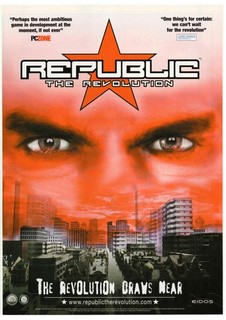
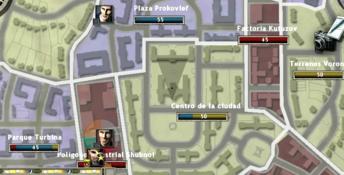


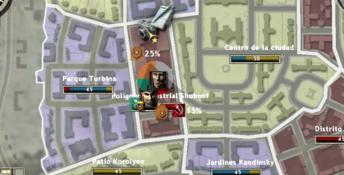
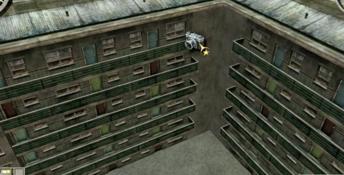
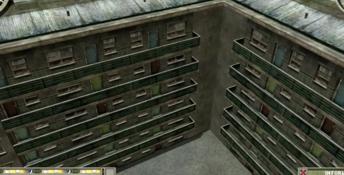
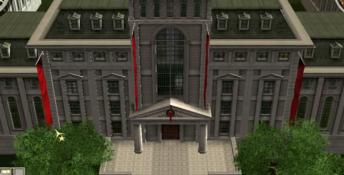
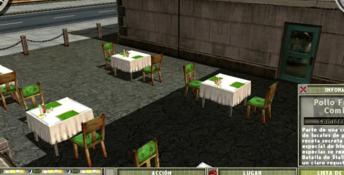
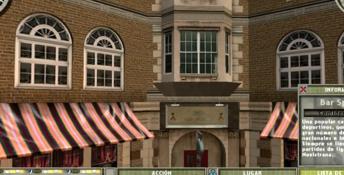
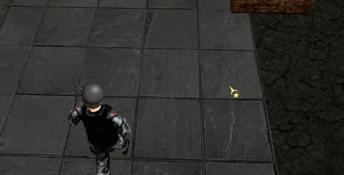
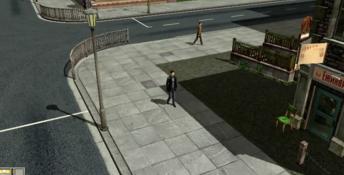
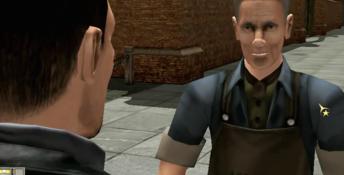
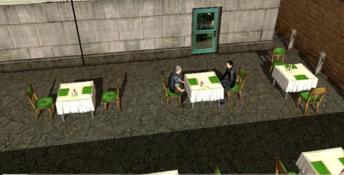
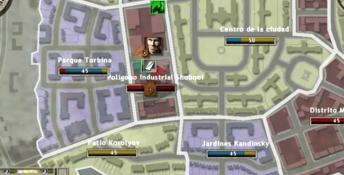
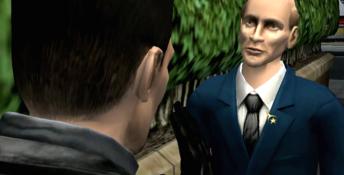
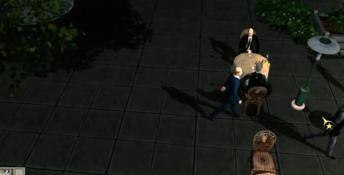
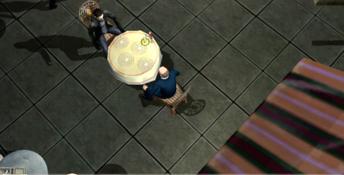
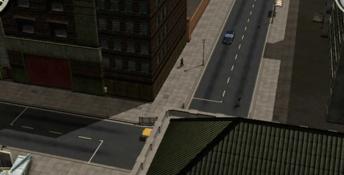
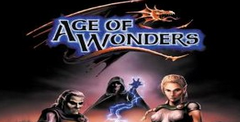 Age of Wonders
Age of Wonders
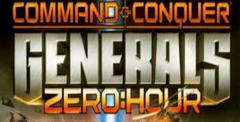 Command & Conquer: Generals - Zero Hour
Command & Conquer: Generals - Zero Hour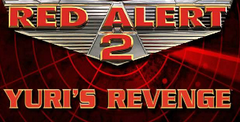 Red Alert 2: Yuri's Revenge
Red Alert 2: Yuri's Revenge Commander: Conquest of the America
Commander: Conquest of the America
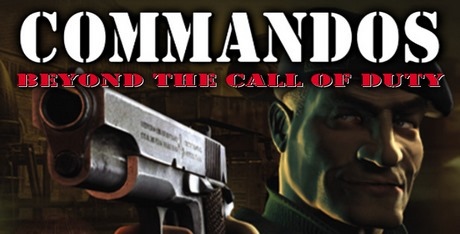 Commandos: Beyond the Call of Duty
Commandos: Beyond the Call of Duty
 Hearts Of Iron 3
Hearts Of Iron 3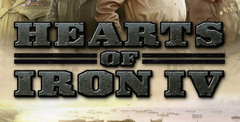 Hearts of Iron 4
Hearts of Iron 4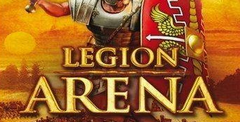 Legion Arena
Legion Arena